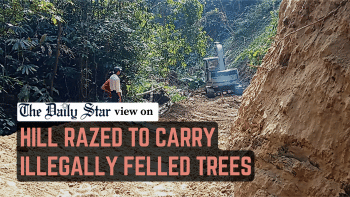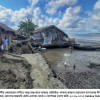Sylhet is losing its storied hillocks, one after another

While reports on hill cutting from Sylhet and other regions of the country are nothing new, a new revelation has raised alarm. According to a report by Prothom Alo, around 20-30 percent of hilloks in the four districts of Sylhet have been cut down over the last 25 years. Only around 1,875 hillocks remain today, but these are in constant danger of being flattened by private individuals and even government agencies. This is really alarming. The question is: can Bangladesh, being one of the most climate-vulnerable countries in the world, afford to chip away at its own natural resources and thereby call for disaster?
In 2012, the High Court had banned all kinds of hill cutting in Sylhet. But as the rampant practice of hill-cutting suggests, hardly anything has been done to enforce the ban. And while the Sylhet office of the Department of Environment is known to conduct drives occasionally, officials reportedly often show up only after a hill or hillock has been cut by the culprits. The effects of this state of affairs have been visible in the intensity of myriad floods and landslides over the past few years, including the 2022 Jaintapur landslide that killed four members of a family. Ironically, the hillocks are often cut so that structures can be built there, but those can hardly stand the test of such "development" activities in the long run.
In the coming days, unless the relevant authorities and district administration take stern action to prevent hill cutting, we may have to see more human-made calamities in our hilly regions. Usually, it is the most disadvantaged groups that reside at the foot of risky hills or on flattened hilly land. It is crucial for the government to rehabilitate these populations humanely, and also stamp down those who are cutting hills for their narrow interests. It is also vital to raise awareness of the massive harm that such environmental degradation—through cutting hills, encroaching and polluting rivers, destroying forests, etc.—is doing to our future as a nation.


 For all latest news, follow The Daily Star's Google News channel.
For all latest news, follow The Daily Star's Google News channel. 









Comments